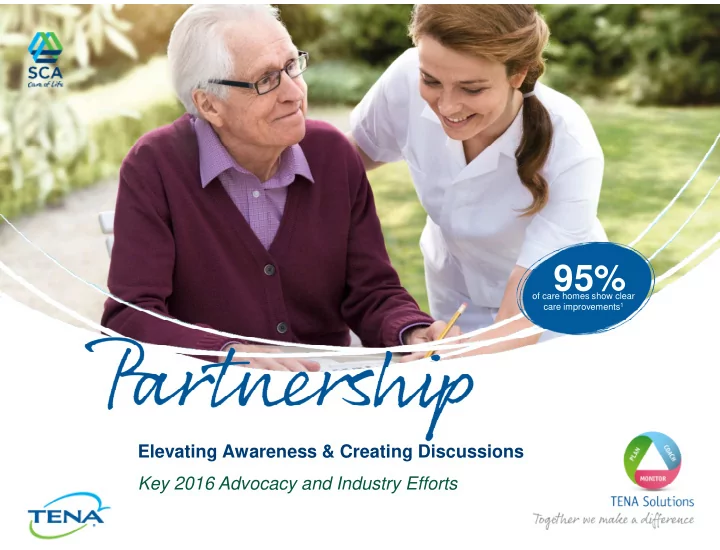

95% of care homes show clear care improvements 1 Elevating Awareness & Creating Discussions Key 2016 Advocacy and Industry Efforts
Innovations & Solutions aligned with Industry priorities …
Elevating awareness & lifting taboos … Partnering with other Industry Leaders Some examples to share … 1. Global Forum on Incontinence 2. Research Institute for Aging 3. The Canadian Nurse Continence Advisors 4. The Canadian Continence Foundation 5. The Ontario Long Term Care Association, and others across Canada 6. Associations & Organizations with like goals locally & globally
Impacts of Incontinence – A Canadian Perspective … Long-term Care Urinary incontinence is currently the most common cause of admission to long- term health care in Canada and the United States. 30 According to the Public Health Agency of Canada the incidence of incontinence rises dramatically - nine to ten times - for seniors resident in long term care facilities compared to seniors residing “at-home” in the community. 30 Falls People with UI symptoms often rush to the bathroom thus, especially amongst seniors, increasing their risk of falls that can lead to fractures and even admission to long-term care facilities. 36 A Canadian Perspective, (2000),The Canadian Continence Foundation, Cameron Institute 30 Public Health Agency of Canada, Division of Aging and Seniors http://www.phac-aspc.gc.ca/seniors- aines/pubs/info exchange/incontinence/exch6_e.htm 36 Brown JS, Vittinghoff E,Wyman JF, et al. (2000) Urinary incontinence: Does it increase risk for falls and fractures? J Am Geriatr Soc 48:721-725.
Removing stigmas & raising awareness …
Please see the GFI website at: www.gfiforum.com
Canadian Industry Leaders Speak at the GFI Dr. Adrian Wagg, University of Alberta Canada Dr. Wagg is Professor of Healthy Ageing and Division Director for Geriatric Medicine in the Faculty of Medicine and Dentistry at the University of Alberta in Edmonton, Canada. Before this he was an Associate Director of the Clinical Effectiveness and Evaluation Unit of the Royal College of Physicians in the UK, where he led the continence in older people programme and the national audits of continence care. He is General Secretary of the International Continence Society and President of the Canadian Continence Foundation Dr. Samir Sinha Mount Sinai and University Health Network Hospitals Canada Dr. Sinha is Director of Geriatrics at Mount Sinai and the University Health Network Hospitals in Toronto and Assistant Professor of Medicine at the University of Toronto and the Johns Hopkins University School of Medicine. Dr. Sinha is an expert in health policy and the delivery of services related to the care of the elderly. In 2012 he was appointed by the Government of Ontario to serve as the expert lead of Ontario's Seniors Strategy and he is now working on the development of a National Seniors Strategy. Dr. Sinha has further consulted and advised hospitals and health authorities in several other countries on the implementation and administration of models of geriatric care that reduce disease burden, improve access and capacity and ultimately promote health. Dr. Jennifer Skelly, CNCA, McMaster Assistant Dean Dr. Veronique Boscart, CIHR Research Chair , Seniors Care, Conestoga College Frankie Bates, NCA, HHN, New Brunswick Jacky Cahill, The Canadian Continence Foundation
Other studies at the 6 th GFI SCA has initiated several scientific Besides these SCA initiated studies a number of studies will be presented, which were initiated by studies to improve the standards of other institutions: continence care including: • Living longer living well , report submitted to the Minister of Health and Long-Term Care and • The Optimal Continence Service Minister Responsible for Seniors on Specification on how to improve the service Recommendations to inform a senior strategy for delivery of continence care and a health Ontario. Dr. Samir K.Sinha, MD,DPhil,FRCPC, economic evaluation of the improved service Provincial lead, Ontario’s Seniors Strategy, delivery by 2015 and 2030 – presented by M All December 2012 • Person Centered Care for people living in • Adequate social protection for long-term care residential care settings – presented by H Wijk needs in an ageing society, report jointly • Cure Rates for the 4 patient profiles , 1. Urine, prepared by the social protection committee and 2. Fecal, 3. Neurologic diseases and the 4. the European commission. Niclas Jacobsson. Elderly. – presented by J Spinks • Report of the Expert panel on Effective Ways • Containment product guidance in clinical and of Investing in Health . Definition of a frame of care guidelines, a mapping study in CA, SE, UK, reference in relation to primary care with a GE, NL, PL, ES. – presented by A Wagg and C special emphasis on financing systems and Aukim Hastie referral systems. Professor Jan de Maeseneer • The burden of incontinence compared to other chronic diseases , a Swedish case study. The study shows the relation between formal and informal care for people with incontinence – presented by Ian Milsom
Access to Papers and Findings • www.gfiforum.com
Canadian Nurse Continence Advisors • Long term partnership • Sponsorship of Male and Female Incontinence BOOKLETS CNCA uses these as a patient guide and as an educational tool o • Sampling Program that supports individualized products at the end user level • Product Selection needs and educational needs The Canadian Continence Foundation • Long term partnership • Sponsorship of Fecal Incontinence Study in collaboration with Cameron Institute • Denial, Shame and Acceptance: Generating Base-line Knowledge and Understanding of Fecal Incontinence Amongst Long-term Care Residents and Care Providers http://www.cameroninstitute.com/2014/04/01/denial-shame-and-acceptance- generating-base-line-knowledge-and-understanding-of-fecal-incontinence-amongst-long- term-care-residents-and-care-providers/ • Phase II of “Fecal Incontinence Research” underway now
Canadian Continence Foundation & Cameron Institute Research & Abstract …
With over 50 years of experience TENA is the world’s leading continence care brand with continence management solutions including a full range of absorbent products, skin care, services and solutions. TENA Solutions are tailored to the needs of individuals, their families and healthcare professionals to help improve dignity and the quality of people’s lives.
Recommend
More recommend